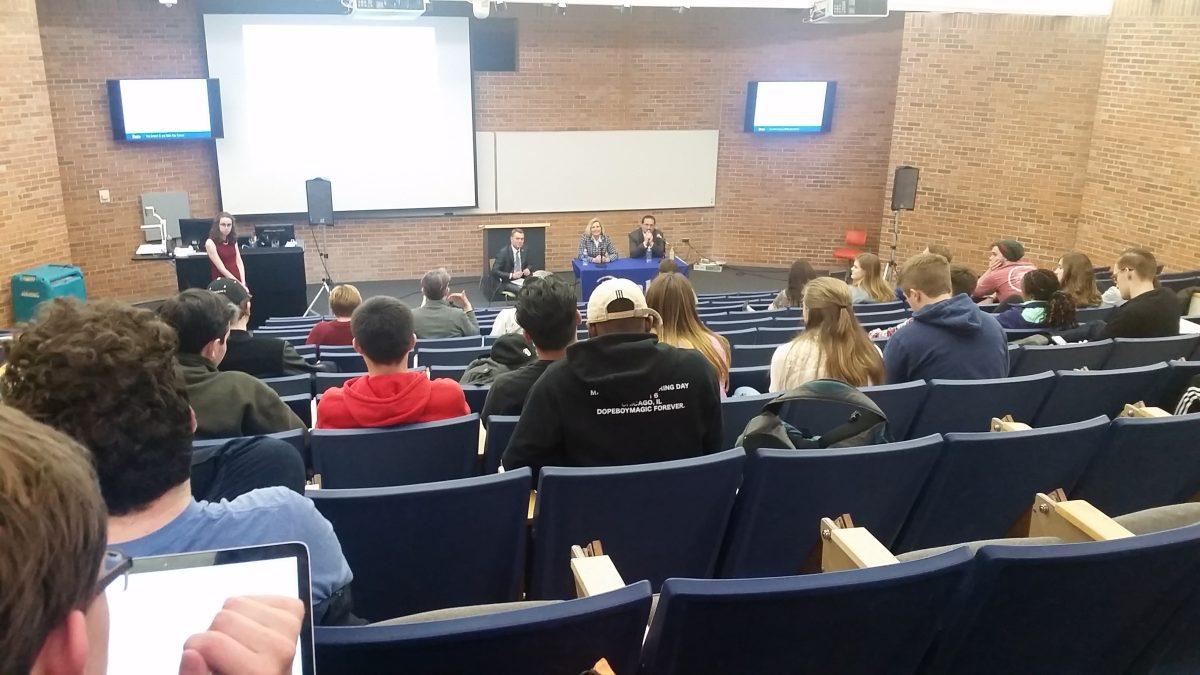“Frontline” dubbed the United States the “Divided States of America” in its documentary on political polarization that became evident throughout and after the election of 2016. Now, Drake students are trying to learn how to talk across the divide.
The first Dialogue at Drake gave a brief overview of how party members work through their differences and how students can begin to engage in meaningful dialogue.
“I’m friends with both conservative and liberal students,” Samantha Bayne, the event organizer, said. “After the election, it seemed impossible to even begin a political conversation without it ending in insults and personal attacks. This had to change, we had to learn to communicate despite our differences.”
The Robert D. and Billie Ray Center welcomed current Iowa Republican Party Chair Dr. Jeff Kaufmann and former Iowa Democratic Party Chair Dr. Andy McGuire.
As they explained in a panel moderated by the director of the Ray Center, Scott Raecker, Kaufmann and McGuire said they have an unlikely friendship. They told students that they learned to work together to achieve the goal of keeping Iowa the first in the nation every four years for caucuses.
“It is important that we help each other,” McGuire said. “Sometimes we get trained to (think), ‘He’s bad cause he’s the other side.’ … I don’t agree with Dr. Kaufmann on most issues. I agree on talking about it.”
The panelists encouraged students to actively seek out others who think differently and hold different beliefs.
“I think we proved to each other that we are Iowans first,” Kaufmann said. “There’s more important things than party. The reason I’m friends with Andie is because I believe she wants what’s best for Iowa.”
Jerry Parker reiterated this idea when he addressed the lecture hall in Olin.
“We must have the courage and curiosity to seek out people who are different from us,” the newly appointed dean of students said. “I would challenge you, who is the least likely person you’d be willing to reach out to?”
Parker then told students to ask that person out for a cup of coffee.
“It’s important to be open to what other people see and think before we talk about what we think,” Parker said.
The dialogue ended with Raecker giving students tips for starting these conversations. He said that students should think about the goals and motives for the conversation. For example, is the motive to share your viewpoint and arguments or to better understand somebody else’s beliefs?
“Seek to understand then to be understood,” Raecker said. “Care about someone because they’re a human being … not treating them as the enemy.”
As a final component of the event, Samantha Bayne, the event organizer, asked students to break up into groups of two to four students and discuss questions about polarization on campus and the ways they can work through it.
For Drake’s future student body president, it was important to be at the dialogue.
“(There’s) obvious polarization on campus between different organizations, different people, ideologies, especially ideologies,” Nathan Paulsen said. “Especially going into big leadership roles that I have, I’m wanting to know from a different perspective how to tackle those issues of polarization.”
The president of College Republicans, Alex Freeman, discussed how members of his group are afraid to share their beliefs on campus.
“In campus classrooms, we have a severe problem with students who feel as though they cannot express their ideas and beliefs as a result of being a conservative or a republican,” Freeman said. “And I want to be able to utilize the tools that these guests presented tonight in my organization’s meetings and how we go forward preceding with events on campus in a way that’s respectful, civil and productive.”
Other students shared the desire to have more opportunities to discuss and practice civil dialogue.
“It’s just cool to have this kind of conversation,” sophomore international relations and strategic political communications major Isabelle Barrett said. “I’ve been wanting there to be something. I only wish that there was more time to talk with everyone … I hope that next time we have a longer period of time to talk about things.”
Another dialogue will be held on April 20 at 5:30 p.m. in Levitt Hall







